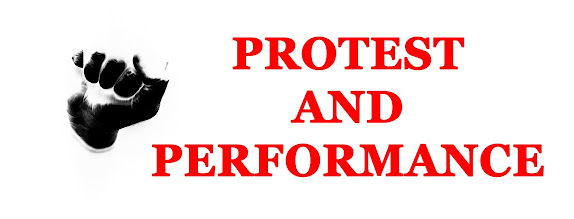PROTEST AND PERFORMANCE
We have seen words to be suspicious previously. The present discussion emerges in its continuation. The dissemination of meaning(s) has been an eventful part of recent socio-cultural history. More than anything else, its primary contribution has been towards inducing the academic world with words overlapped with intelligentsia-induced multiplicity of meanings. A specific mathematical set of words can be defined characteristically to be in dire need of elaborate annotations. Even the possible logics of defense that can be brought forth by propagators of subjectivism falls flat here. Meanings of words used in critical discourse of the social sciences lack correspondence to the general population. Although it is true that disciplinary specialization calls for specification in terminology, that is not the case here. Meanings to various words (either coined, doctored, or shifted semantically) serve a characteristic monopoly correspondence to their authors. Not going into a scrupulous survey of such words, to make it more clear, the intention is not to defame any particular intellectual contribution, but the accusation is directed towards present apparent practitioners of critical discourse. More than looking critically into the fundamentals of the subject of discussion, they seem to create academic collages - practicing a form of mimetic Dadaistic creativity. This eventually leads only to a play of words borrowed from past traditions and notions; and because of its lacking rootedness in the present, it ultimately fails in Praxis. As a result, social sciences - the domain which stands closest to the mass in general, its own location disintegrates. This crisis which quite paradoxically is rarely denied yet hugely practiced, appears to be inaugurating a new Middle Age where knowledge is more than just being centralized - its boundary walls are being built higher and higher. Although such a practice is not generally intentional, but rather reflective of unconscious ideological encroachment, practitioners on the ladder of academia end up being bricklayers to the wall. Their contributions are essentially detrimental. Being vibrant with many hypothetical, axiomatic propositions, in reality it subverts its own purpose.
| Students perform out mime to voice their demands |
If this seems like a negation of cultural development, then to make things clear, there have been certain junctures in history where cultural texts and performers have embodied a clear sense of purpose. They have survived the tide of time. Their culture reflects politics; hence, their performance too. They have been political. Their culture was political. They were not skeptics. Hence, there have been texts which are known to be ‘revolutionary ’. At this point the clear line drawn earlier seems to get blurred. That is not the case. It is not always easy to decipher from the appearance of things their essential nature. The domain of engagement thus becomes much deeper. It is explicitly on the ground of purpose that politics and performance differ in appearance. While both engage in a tussle against detrimental institutional apparatuses, the former does so explicitly, and the later implicitly. They merge together in their conception of engaging with the masses politically (the possibility of which seems to be waning away rapidly), and at the executive level, it is the protest which encapsulates this whole paradigm. Performances build the ground for protests. And protests (which might include performances) further propagate developments in the cultural sphere. It is this dialectical nature that has reverberated profoundly throughout history. That has been the essential element of our progress. That is our culture. That is our politics. Our culture is inevitably political and our politics - cultural. Man is social; hence, cultural; hence, political.





Comments
Post a Comment